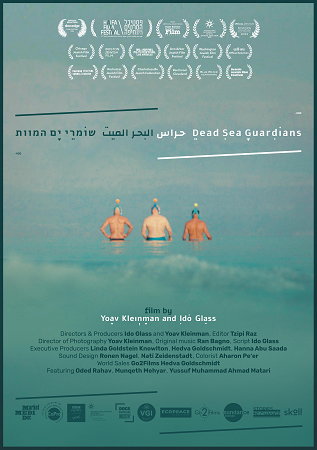
Dead Sea Guardians 2021
Distributed by Good Docs
Produced by Ido Glass and Yoav Kleinman
Directed by Ido Glass and Yoav Kleinman
Streaming, 78 mins
College - General Adult
Environmental Science; Environmentalism; International Studies
Date Entered: 09/06/2023
Reviewed by Lonnie Frazier, Community Outreach Coordinator, Making Change MediaThe documentary Dead Sea Guardians undertakes a comprehensive exploration of the multifaceted challenges facing the iconic Dead Sea—a geological, ecological, and geopolitical marvel. The Dead Sea, nestled at Earth's lowest point, once stood as a global attraction, drawing tourists worldwide in the 1980s. This documentary commences by unveiling this glorious past and subsequently exposes the stark contrast of its present reality. It underscores how the Dead Sea has been a casualty of persistent regional conflicts, as the control of water resources emerges as a critical factor in these conflicts.
At the heart of the film are the stories of three individuals: Munqeth, representing Jordan; Oded, an Israeli; and Yusuf, a Palestinian. Their shared disgust at the environmental degradation and conflict within their countries drives them to a remarkable undertaking—to swim across the Dead Sea. Their mission transcends mere symbolism; it aims to capture the attention of the international community and instigate change.
The documentary unfolds on three interconnected levels. Firstly, the film explores the environmental importance of the Dead Sea. It provides a historical backdrop to the Dead Sea, unraveling the forces that have contributed to its gradual demise. From mineral extraction, loss of water flowing from the Sea of Galilee and the Jordan River, and the sinkholes caused by the depletion of the Dead Sea, the film shows the environmental causes that have led to the current condition of this natural wonder. Its visually captivating sequences, particularly the panoramic aerial shots captured by drones, present both the beauty of the region and the scars of its degradation. The archival images and footage of the glory days of Dead Sea resorts present a stunning reminder of what has been lost.
Secondly, the film probes the relentless efforts of Munqeth, Oded, Yusuf, and their work with the organization, EcoPeace, in orchestrating this audacious feat. The struggle to enlist volunteers from all three nations—Jordan, Israel, and Palestine—exposes the entrenched obstacles of politics, racism, and deep-seated enmities. This human aspect of the narrative is one of the documentary's most poignant facets. In particular, watching the families of Oded and Yusuf interact with one another while picnicking near the Dead Sea, the viewer glimpses the potential for peace that can be found in having a common goal.
The third dimension of the film accentuates the intricate web of regional politics, with particular emphasis on the influence wielded by the military forces of the three nations. The inextricable links between geopolitics, water resources, and the protagonists' mission come to the forefront, shedding light on the complexities they face. As one interviewee said, ‘...water is power, and you don’t give power to your enemies’.
The film maintains a realistic approach, sparing itself from over-heroizing the protagonists' actions. Even during their perilous swims, the documentary presents them as ordinary individuals driven by an extraordinary cause. Despite moments of optimism, the documentary's conclusion strikes a pragmatic tone, highlighting the limited impact of their efforts in the broader context of the region. This pragmatism underscores the harsh realities faced by environmental activists in the face of complex geopolitical dynamics.
Dead Sea Guardians skillfully engages viewers while conveying the multifaceted challenges confronting this unique geographical wonder. Its tripartite narrative structure underscores the intricate interplay between environmental activism and regional politics, providing an enlightening perspective for scholars and audiences alike. Ultimately, the documentary serves as a compelling case study in the fields of environmental studies and international relations, urging a closer examination of the intricate nexus between ecological preservation and geopolitical complexities.
Awards: Riviera International Film Festival: Winner, Special Mention
Published and licensed under the Creative Commons Attribution 4.0 license. Anyone can use these reviews, so long as they comply with the terms of the license.